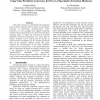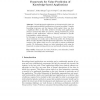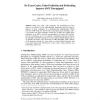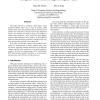114
click to vote
TC
2002
15 years 1 months ago
2002
Value prediction is a technique that breaks true data dependences by predicting the outcome of an instruction and speculatively executes its data-dependent instructions based on th...
113
click to vote
TOCS
1998
15 years 1 months ago
1998
This paper presents an experimental and analytical study of value prediction and its impact on speculative execution in superscalar microprocessors. Value prediction is a new para...
113
click to vote
BIS
2009
15 years 3 months ago
2009
Knowledge-based applications are characterized by their use of machine-understandable formalizations of expert knowledge. Complex knowledge structures, and the features which explo...
122
click to vote
ARCS
2006
Springer
15 years 5 months ago
2006
Springer
While trace cache, value prediction, and prefetching have been shown to be effective in the single-threaded superscalar, there has been no analysis of these techniques in a Simulta...
118
click to vote
MICRO
1996
IEEE
15 years 6 months ago
1996
IEEE
For decades, the serialization constraints imposed by true data dependences have been regarded as an absolute limit--the dataflow limit--on the parallel execution of serial progra...
122
click to vote
ICS
1999
Tsinghua U.
15 years 6 months ago
1999
Tsinghua U.
Memory operations remain a significant bottleneck in dynamically scheduled pipelined processors, due in part to the inability to statically determine the existence of memory addr...
117
click to vote
ISCA
1999
IEEE
15 years 6 months ago
1999
IEEE
This paper presents a technique called register value prediction (RVP) which uses a type of locality called register-value reuse. By predicting that an instruction will produce th...
ISCA
1999
IEEE
15 years 6 months ago
1999
IEEE
Value Prediction is a relatively new technique to increase instruction-level parallelism by breaking true data dependence chains. A value prediction architecture produces values, ...
128
click to vote
IEEEPACT
1999
IEEE
15 years 6 months ago
1999
IEEE
This paper focuses on the problem of how to find and effectively exploit speculative thread-level parallelism. Our studies show that speculating only on loops does not yield suffi...
103
click to vote
MICRO
2000
IEEE
15 years 6 months ago
2000
IEEE
In this work we show that value prediction can be used to avoid the penalty of long wire delays by predicting the data that is communicated through these long wires and validating...




